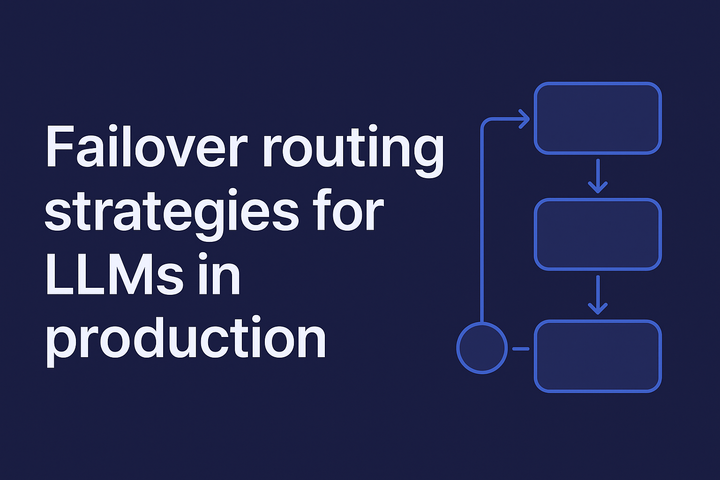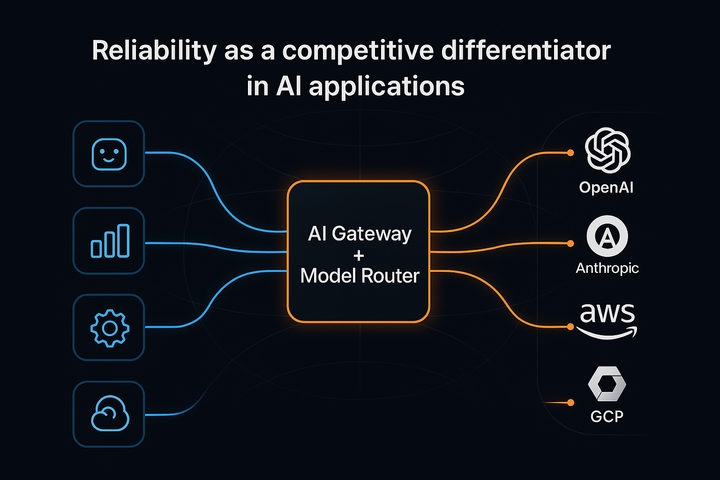Geo-location based LLM routing: Why it matters and how to do it right
As LLM-powered applications scale across global markets, user expectations around performance, reliability, and data compliance are higher than ever.
Enterprises now prefer geo-location-based routing. Whether it's reducing latency, staying compliant with regional data laws, or optimizing infrastructure costs, geo-routing ensures your AI workloads are not just smart, but also efficient and responsible.
What is geo-location-based LLM routing?
Geo-location-based LLM routing refers to the process of directing user requests to different LLM providers or regions based on the user's physical location. The goal is to route each request to the most suitable model endpoint — typically the one closest to the user — to improve performance, meet regional compliance needs, or control costs.
It works similarly to how content delivery networks (CDNs) serve static assets from nearby servers, but in this case, it’s about dynamically routing requests to AI models.
Why does geo-routing matter for LLM applications?
As AI applications go global, a one-size-fits-all approach to routing LLM requests quickly breaks down. Here’s why geo-location-based routing is essential:
1. Lower latency, better UX
Users expect fast, real-time interactions — especially with AI assistants and chatbots. Routing requests to the nearest data center or model endpoint significantly reduces round-trip time and improves responsiveness.
2. Data residency and compliance
Many regions have strict data governance laws (like GDPR in the EU or HIPAA in the US). Geo-routing helps ensure data stays within approved regions, reducing the risk of compliance violations.
3. Cost optimization
LLM providers often have region-based pricing. Routing requests based on location — and choosing the most cost-effective provider per region — can cut down your overall spend without sacrificing performance.
4. Redundancy and availability
Geo-routing also allows for intelligent failover. If a model in one region becomes unavailable, traffic can be rerouted to a backup region, ensuring your app stays online even during outages.
In short, geo-routing isn't just a backend optimization — it's critical infrastructure for running globally scalable, responsible LLM-powered applications.
Real-world use cases
Geo-location-based LLM routing is already powering a range of real-world applications, especially where performance, compliance, and cost matter at scale.
Take a global SaaS company offering AI-powered support — users across North America, Europe, and Asia expect instant responses from chatbots. By routing requests to the nearest LLM endpoint, the company ensures faster response times and keeps user experience consistent, no matter where the user is located.
In highly regulated industries like healthcare, geo-routing plays an even more critical role. A telehealth platform, for example, might route patient queries only to models hosted within their country of residence. This ensures that sensitive health data never leaves national borders, helping the company stay compliant with data residency laws like HIPAA in the US or PIPEDA in Canada.
For multinational enterprises, geo-routing is also a cost optimization strategy. Instead of relying on a single provider globally, they can route traffic to the most cost-effective or performant provider in each region, like using OpenAI in the US, Cohere in Canada, and Mistral in the EU, all without disrupting their application logic.
Even in sectors like edtech, where user bandwidth varies across regions, geo-routing can help. An education platform serving students across Southeast Asia and Latin America might route interactions through regionally optimized endpoints, ensuring smoother performance and a better learning experience.
How Portkey’s AI gateway enables geo-based LLM routing
Portkey’s AI gateway simplifies geo-location-based LLM routing by acting as a dynamic gateway between your application and multiple LLM providers. Instead of hardcoding routing logic or juggling region-specific endpoints, you can define intelligent routing rules directly within Portkey’s control panel or via its API.
Every request can be enriched with metadata, and you can use this metadata to route traffic to the most appropriate model in real time. For example, you could set up a rule to route all European traffic to Mistral or Azure OpenAI (EU region), and US traffic to OpenAI or Anthropic’s US-hosted models — all without touching your application code.
{
"_user": "user-123", # Who made this request?
"environment": "prod", # Where was it made from?
"feature": "chat-assist", # What feature was using AI?
"request_id": "42aff12" # Your internal tracking ID
"location":"EU" # Your location
}
The gateway also makes failover seamless. If a primary endpoint fails or rate limits are hit, you can fallback to a backup model in the same or nearest allowed region, without violating compliance or breaking the user experience.
Everything is observable. The LLM gateway logs every request with complete metadata, including which route was taken, why a fallback occurred, and how long the request took. This gives teams full visibility and control, making debugging and optimization far simpler than stitching together logs from multiple LLM vendors.
And most importantly, the AI gateway was designed with scale in mind. Whether you're serving 10 or 10 million requests a day, Portkey ensures that your routing logic remains clean, maintainable, and easy to evolve as your app and model stack grow.
Get started with smarter routing
Geo-location-based routing is a foundational capability that directly impacts how fast your app feels, how much it costs, and whether it meets regional data regulations.
With metadata-based routing, automated fallbacks, and full visibility into every request, Portkey gives teams a powerful, scalable way to route LLM traffic intelligently across regions — without burying logic in application code.
If you're building globally distributed LLM apps, it’s time to implement smarter routing. Try Portkey today.



